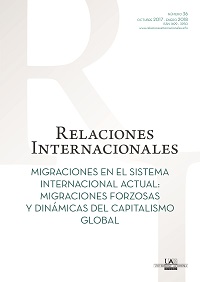Keywords:
Asylum , European Union , Migration , Discrimination , International protection , Agreements , Safe third countryCopyright (c) 2017 Andrea BORJA GONZALO

This work is licensed under a Creative Commons Attribution-NonCommercial-NoDerivatives 4.0 International License.
Abstract
The article seeks to analyze the special agreements, measures, programs and action plans the European Commission has implemented to address the current migratory situation in Europe and how these mechanisms discriminate against asylum seekers depending on their nationality. Together, Greece and Italy are the countries in the European Union where most migrants / refugees and asylum seekers first arrive and experience the direct consequences of these agreements, measures and decisions taken within European borders. With that in mind, this article will focus on the Greek case. The most recent research projects on forced migration focus on the Syrian conflict, paying little attention to other conflicts and nationalities such as the Afghan, Iraqi, Iranian, Pakistani and Palestinian nationals seeking refuge in Europe. Significant numbers of asylum seekers from the above mentioned countries have been arriving in Greece every month since 2015. Access or restriction to services and programs depending on the nationality of the asylum seeker implies a clear discrimination which is based on their national origin, as well as the emergence of categories like first or second class refugee. The relocation program clearly discriminates against asylum applicants depending on their country of origin since just 7 different nationalities, as well as those considered stateless persons, are eligible for such program.
Downloads
References
ACNUR, “Nota sobre la Carga y el Mérito de la Prueba en las Solicitudes de Asilo”, 16 de diciembre de 1998: http://www.acnur.org/t3/fileadmin/Documentos/BDL/2002/1906.pdf [Consultado el 16 de abril de 2017]
ALCAIDE, Xavier, “Por qué la crisis de los refugiados no es una crisis de refugiados”, Por la Paz/Peace in Progress, nº29, noviembre 2016.
ALPES, Jill y TUNABOYLU, Sevda, “The EU-Turkey deal:what happens to people who return to Turkey?, febrero de 2017: http://postdeportation.org/2017/02/the-eu-turkey-deal-what-happens-to-people-who-return-to-turkey/
AMINISTÍA INTERNACIONAL, “EU-Turkey deal: Europe’s year of shame”, 2017: https://www.amnesty.org/en/latest/news/2017/03/the-eu-turkey-deal-europes-year-of-shame/ [Consultado el 16 de abril de 2017]
AMNISTÍA INTERNACIONAL, “Pakistan Annual report”, 2017: https://www.amnesty.org/en/countries/asia-and-the-pacific/pakistan/report-pakistan/ [Consultado el 21 de abril de 2017]
AMNISTÍA INTERNACIONAL, “Refugees. Human Rights have no borders”, 1997.
CARR, Christian A., “Civil-Military Engagement Program: Enhancing the Mission of Regionally Engaged Army Forces”, Military Review, vol. 96, no 2, 2016.
CARRERA, Sergio, et al, “The EU's Response to the Refugee Crisis: Taking Stock and Setting Policy Priorities”, Ceps Essay, nº20, diciembre 2015.
CONSTANT, Amelie F., ZIMMERMANN, Klaus F. “Towards a new European refugee policy that works”, DICE Report, vol. 14, no 4, 2016.
Comunicación COM 240 final, de la Comisión al Parlamento Europeo, al Consejo, al Comité Económico y Social Europeo y al Comité de las Regiones sobre “Una agenda europea de migración”, 2015: http://eur-lex.europa.eu/legal-content/ES/TXT/HTML/?uri=CELEX:52015DC0240&from=EN [Consultado el 18 de abril 2017]
Comunicación COM 205 final, de la Comisión al Parlamento Europeo y al Consejo Europeo y al Consejo, de 2 de marzo, sobre “Third Progress Report on the Partnership Framework with third countries under the European Agenda on Migration”, 2017: https://eeas.europa.eu/sites/eeas/files/com_2017_205_f1_report_from_commission_en_v8_p1_880005_0.pdf [Consultado el 21 de abril 2017]
EUROPEAN UNION AGENCY FOR FUNDAMENTAL RIGHTS, “Opinion of the European Union Agency for Fundamental Rights on fundamental rights in the ‘hotspots’ set up in Greece and Italy”, 2016: http://fra.europa.eu/en/opinion/2016/fra-opinion-fundamental-rights-hotspots-set-greece-and-italy [Consultado el 18 de abril de 2017]
EUROPEAN UNION, EXTERNAL ACTION, “Join Way Forward on migration issues between Afghanistan and EU”, 2016: https://eeas.europa.eu/sites/eeas/files/eu_afghanistan_joint_way_forward_on_migration_issues.pdf [Consultado el 20 de abril de 2017]
FARGUES, Philippe, DI BARTOLOMEO, Anna, “Drowned Europe”, Brief Policy, 2015.
FURTAK, T. Florian, “The refugee crisis-A challenge for Europe and the world”, Journal of civil & legal sciences, vol. 5, Issue 1, 2015.
GREEK COUNCIL FOR REFUGEES, “Greece country report”, Asylum Information Database, 2017: http://www.asylumineurope.org/reports/country/greece [Consultado el 17 de abril de 2017]
MINISTERIO GRIEGO DEL INTERIOR, “Questions and Answers”, 2016: http://asylo.gov.gr/en/wp-content/uploads/2016/10/Qandanswers_ENG_OCT_V6.pdf [Consultado el 16 de abril de 2017]
GREEK FORUM OF REFUGEES, “Not too late to act responsibly: stop deporting Afghan to un unsafe country!”, February 2017: http://refugees.gr/not-late-act-responsibly-stop-deporting-afghans-unsafe-country/
HATTON, Timothy J., “Refugees and Asylum seekers, the crisis in Europe and the future of policy”, Economic Policy, vol. 32, no 91, 2017, ps. 447-496.
HUMAN RIGHTS WATCH, “World report 2017:Pakistan”, 2017: https://www.hrw.org/world-report/2017/country-chapters/pakistan [Consultado el 21 de abril de 2017]
MAJIDI, Nassim, “Afghan and Somali (post-) conflict migration to the EU”, Forced Migration Review, no 51, 2016.
NACIONES UNIDAS, ASAMBLEA GENERAL, “Informe del Relator Especial sobre las ejecuciones extraoficiales, sumarias y arbitrarias Christof Heyns: El uso de la tecnología de la información y la comunicaciones para garantizar el derecho a la vida”. A/HCR/29/37 (24 de abril de 2015).
NAIR, Sami, Refugiados: frente a la catástrofe humanitaria, una solución real, Crítica, Barcelona, 2016.
ORGANIZACIÓN INTERNACIONAL PARA LAS MIGRACIONES, Press release: “Information event in the framework of the Programme: The Implementation of Assisted Voluntary Returns including Reintegration Measures”: https://greece.iom.int/en/news/iom-information-event-framework-programme-%E2%80%9C-implementation-assisted-voluntary-returns-including [Consultado el 18 de abril de 2017]
PARK, Jeanne, “Europe’s migration crisis”, New York: Council of Foreign Relations, 2015, ps. 311-325.
PRIETO, Beatriz, “Los hotspots, un eslabón débil en la gestión de la crisis de los refugiados”, Real Instituto Elcano, 2016: http://www.realinstitutoelcano.org/wps/portal/rielcano_es/contenido?WCM_GLOBAL_CONTEXT=/elcano/elcano_es/zonas_es/demografia+y+poblacion/ari25-2016-prieto-hotspots-eslabon-debil-gestion-crisis-refugiados [Consultado el 21 de abril de 2017]
RITZEN, Jo, KAHANEC, Martin, “A Sustainable Immigration Policy for the EU”, A Second Chance for Europe, Springer International Publishing, 2017, ps. 155-181.
RUMI, Raza Ahmad, “Pakistan: Ungoverned Spaces”, Telling the story, 2016.
RUTTIG, Thomas, “Preamble: Afghans as a second-class refugees in parts of Europe”, En CIDOB Monografías, Telling the story, sources of tension in Afghanistan & Pakistan: A regional perspective (2011-2016), octubre 2016.
TSOURDI, Evangelia Lilian, DE BRUYCKER, Philippe, “EU asylum policy: In search of solidarity and access to protection”, Brief Policy, 2015.





